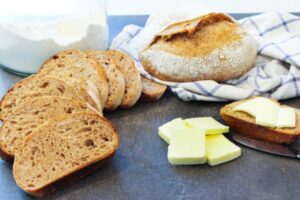Baking bread can seem like an art reserved for seasoned bakers, but with the right techniques and a bit of guidance, anyone can create bakery-quality loaves at home. If you’re looking to improve your bread-baking skills and create that perfect loaf every time, you’ve come to the right place. In this article, we’ll dive deep into the best practices and tips that will elevate your baking game, ensuring you achieve that golden crust and soft, flavorful interior every time.
Understanding the Basics of Bread Baking

The Importance of Quality Ingredients
Before diving into the specifics, it’s crucial to understand the role that ingredients play in bread baking. High-quality ingredients can make a significant difference in the taste and texture of your bread.
- Flour: Opt for high-protein flour such as bread flour for better gluten development.
- Yeast: Fresh yeast or high-quality active dry yeast will give your bread a good rise.
- Water: Use filtered water for the best results, as tap water can sometimes interfere with yeast activity.
The Role of Technique
Techniques in bread baking are just as important as ingredients. Proper kneading, proofing, and baking are key to a successful loaf.
- Kneading: Ensure your dough is kneaded properly to develop the gluten structure.
- Proofing: Allow the dough to rise adequately; this can take longer in cooler environments.
- Baking: Preheat your oven thoroughly and use a baking stone for an even crust.
Essential Tips for Perfect Bread
1. Master the Dough Consistency
The texture of your dough can make or break your bread. Aim for a dough that is slightly tacky but not overly sticky.
- Adjusting Consistency: Add flour or water in small increments to achieve the right consistency.
- Testing the Dough: Perform the “windowpane test” by stretching a small piece of dough; it should form a thin, translucent membrane without tearing.
2. Perfect Your Proofing Times
Proofing is crucial for developing the flavor and texture of your bread. Over-proofing or under-proofing can lead to undesirable results.
- First Proof: Allow the dough to double in size; this usually takes 1-2 hours.
- Second Proof: After shaping the dough, let it rise again for about 30-60 minutes before baking.
3. Use the Right Temperature
Bread baking requires precise temperature control. Both the dough and oven temperatures play a role in achieving the perfect loaf.
- Dough Temperature: Aim for a dough temperature between 75°F and 78°F for optimal yeast activity.
- Oven Temperature: Bake bread at a temperature between 375°F and 450°F, depending on the recipe.
4. Enhance Flavor with Add-Ins
Adding ingredients like herbs, cheeses, or nuts can elevate your bread and make it unique.
- Herbs: Fresh or dried herbs can add a burst of flavor.
- Cheese: Incorporate shredded cheese for a savory twist.
- Nuts and Seeds: Add texture and flavor with nuts or seeds.
5. Learn the Art of Scoring
Scoring your bread before baking helps control how the bread expands in the oven and can enhance its appearance.
- Tools: Use a sharp blade or bread lame for clean cuts.
- Technique: Score the dough just before baking, making quick, decisive cuts.
Frequently Asked Questions (FAQs)
What is the difference between bread flour and all-purpose flour?
Bread flour has a higher protein content compared to all-purpose flour, which helps in better gluten development and gives bread its chewy texture.
How can I fix over-proofed dough?
If your dough has over-proofed, gently deflate it and reshape it. Allow it to rise again briefly before baking.
Can I use a regular oven instead of a baking stone?
While a baking stone helps create a better crust, you can still achieve great results with a regular oven. Just make sure to preheat it well and consider using a baking sheet.
How can I store homemade bread to keep it fresh?
Store homemade bread in an airtight container or a paper bag at room temperature for a few days. For longer storage, freeze the bread in plastic wrap and foil.
Why is my bread dense and heavy?
Dense bread could be the result of under-kneading, using too much flour, or not allowing the dough to rise enough. Make sure to follow the recipe closely and check your dough’s consistency.
Conclusion
Baking the perfect bread is both a science and an art. By mastering the basics and applying these essential tips, you’ll be well on your way to creating delicious, bakery-quality bread right in your own kitchen. Remember, practice makes perfect, so keep experimenting with different techniques and ingredients to find what works best for you.
With these insights, you’re now equipped to bake with confidence and impress anyone who tastes your homemade creations. Happy baking!

